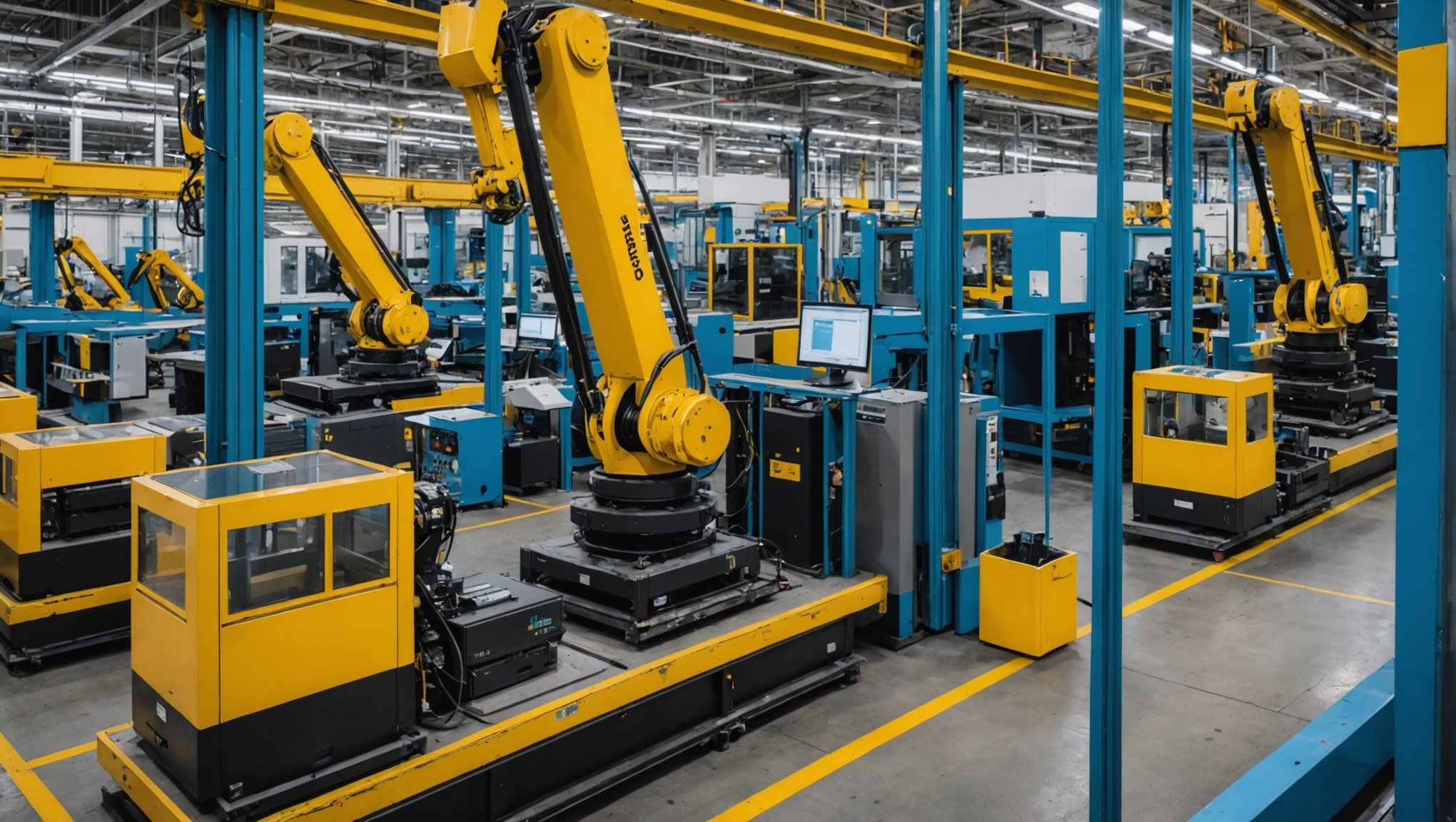Revolutionizing Manufacturing: How AI Can Streamline and Enhance Supply Chain Management
In the rapidly evolving landscape of the manufacturing industry, artificial intelligence (AI) is emerging as a game-changer, transforming the way supply chains are managed. From enhancing forecasting accuracy to optimizing logistics, AI is revolutionizing every aspect of supply chain management. Here’s a deep dive into how AI is streamlining and enhancing supply chains, and what this means for manufacturers and their operations.
Enhancing Forecasting Accuracy with AI
One of the most significant challenges in supply chain management is accurate demand forecasting. Traditional methods often rely on historical data and can be prone to errors, leading to issues such as overstocking or understocking. However, AI-powered algorithms are changing this narrative.
Also read : How the ai checker ensures your content is truly original
AI can analyze a vast array of data, including historical sales, market trends, seasonal variations, and even external factors like weather patterns. This comprehensive analysis enables AI systems to generate more precise demand forecasts. For instance, AI can predict demand spikes during holiday seasons or adjust forecasts based on weather conditions that might affect consumer behavior[1].
Here are some key ways AI enhances forecasting accuracy:
Also to see : Unlocking security: the power of a smart password generator
- Historical Data Analysis: AI systems can process large volumes of historical data to identify patterns and trends.
- Real-Time Data Integration: AI can incorporate real-time data from various sources, such as social media, weather forecasts, and economic indicators.
- Machine Learning Algorithms: These algorithms learn from the data and improve forecasting models over time.
- Predictive Analytics: AI uses predictive analytics to forecast future demand, reducing the risk of overstocking or understocking.
Streamlining Inventory Management
Effective inventory management is crucial for supply chain efficiency. AI plays a pivotal role in optimizing inventory levels, reorder points, and replenishment strategies.
AI systems can analyze data in real-time to ensure that inventory levels are aligned with demand. Here’s how AI streamlines inventory management:
- Real-Time Monitoring: AI tracks inventory levels in real-time, enabling immediate adjustments to inventory.
- Automated Reordering: AI can automate the reordering process based on predefined thresholds, ensuring that products are always available when needed.
- Optimized Storage: AI helps in optimizing storage space by identifying the most efficient storage strategies and reducing carrying costs[1].
Automating Routine Tasks
AI is revolutionizing supply chain management by automating repetitive and time-consuming tasks. This automation frees up human resources to focus on more strategic activities.
Here are some routine tasks that AI can automate:
- Data Entry: AI can automate data entry tasks, reducing the likelihood of human error and increasing efficiency.
- Invoice Processing: AI-powered systems can process invoices quickly and accurately, streamlining financial operations.
- Order Tracking: AI can track orders in real-time, providing instant visibility into supply chain operations and enabling proactive decision-making[1].
Enhancing Supplier Management
Managing suppliers effectively is a critical aspect of supply chain management. AI can assess supplier performance by analyzing various factors, such as on-time delivery, product quality, and pricing.
Here’s how AI enhances supplier management:
- Performance Analysis: AI evaluates supplier performance based on key metrics, helping businesses make informed decisions.
- Real-Time Monitoring: AI continuously monitors supplier performance, enabling swift adaptations to changing market dynamics.
- Collaborative Relationships: AI fosters more collaborative and reliable relationships with suppliers, leading to improved product quality and supply chain reliability[1].
Real-Time Visibility and Decision Making
AI-powered supply chain solutions offer real-time visibility into every aspect of the supply chain. This includes tracking shipments, monitoring inventory levels, and identifying potential disruptions.
Here are some ways AI enhances real-time visibility and decision making:
- Tracking Shipments: AI tracks shipments in real-time, providing immediate updates on their status.
- Inventory Monitoring: AI monitors inventory levels in real-time, enabling proactive adjustments to inventory.
- Disruption Identification: AI identifies potential disruptions and provides recommendations for mitigating their impact[1].
The Role of Generative AI and Simulation in Supply Chain Visibility
Generative AI, when combined with AI simulation, offers a transformative approach to supply chain visibility. This combination enables businesses to navigate complexity and uncertainty more effectively.
Here’s how generative AI and simulation work together:
- Complex System Simulation: This technique models the complexity of the supply chain, simulating the impact of decisions and disruptions on future performance.
- AI-Guided Optimization: AI algorithms optimize simulations to achieve the best trade-off of targeted KPIs, identifying the most vulnerable nodes in the supply chain.
- Machine Learning Forecasts: AI uses machine learning forecasts as input for demand variations, predicting the impact on supply chain performance and recommending optimal demand to consider.
- Generative AI: This adds a layer of rapid interaction and guidance, making advanced visibility more accessible to decision-makers[2].
Integrating AI and IoT for Smarter Supply Chains
The combination of AI and the Internet of Things (IoT) is a powerful duo in transforming supply chain operations. Here’s how they work together:
- Real-Time Data Collection: IoT devices collect and transmit data from devices, machines, and sensors in real-time.
- Data Analysis: AI analyzes this data to generate insights, make predictions, and suggest decisions.
- Demand Forecasting and Inventory Optimization: AI predicts demand and optimizes inventory levels based on data from IoT sensors.
- Route Optimization and Fleet Management: AI processes data from IoT devices in vehicles to recommend optimized routes and reduce delivery times[4].
Optimizing Processes for Better Customer Delivery
AI is instrumental in optimizing various processes to ensure timely and efficient customer delivery. Here are some key areas where AI makes a significant impact:
- Predictive Maintenance: AI analyzes data from sensors and historical performance to schedule maintenance activities at optimal times, minimizing downtime and reducing emergency repair costs.
- Route Planning and Inventory Management: AI optimizes route planning and inventory management by considering factors such as traffic conditions and demand fluctuations.
- Quality Control: AI enhances quality control by identifying potential issues before they affect product quality, leading to an 18% reduction in product defects[3][5].
Implementing AI for Customer-Centric Supply Chain Convergence
To fully leverage AI in supply chain management, organizations should adopt a holistic approach. Here are some key steps to consider:
- Deploying AI-Driven Tools: Use AI-driven tools to monitor and manage supply chain operations from a centralized dashboard, providing proactive intelligence and alerts.
- Fostering an Ecosystem-First Approach: Integrate all supply chain components to ensure seamless information flow and collaboration, breaking down silos and fostering a customer-centric supply chain.
- Continuous Improvement through AI: Regularly update and refine AI algorithms to adapt to evolving market conditions and customer demands, ensuring the supply chain remains agile and capable of meeting customer expectations[3].
Stakeholder Benefits of AI-Driven Supply Chain Convergence
The integration of AI in supply chain management benefits all stakeholders involved. Here are some key benefits:
- Operational Efficiency: AI enhances operational efficiency by identifying and addressing inefficiencies, optimizing processes, and reducing operational costs.
- Cost Savings: Early adopters of AI in supply chain management have experienced a 15% reduction in logistics costs and a 35% decrease in inventory levels.
- Revenue Increase: Organizations often see increased revenue in the same year they implement advanced supply chain technology.
- Improved Decision Making: AI-driven insights provide actionable data that supports better strategic decisions, enabling organizations to identify profitable areas, optimize pricing strategies, and forecast demand more accurately[3][5].
Market Growth and Future Trends
The market for AI in supply chain management is expected to boom, with revenues projected to reach $157.6 billion by 2033. Here are some key growth factors and future trends:
- Efficiency and Speed: The need for greater efficiency and speed in supply chain operations is driving the adoption of AI.
- Predictive Maintenance: Around 70% of manufacturers have embraced AI for predictive maintenance, minimizing downtime and enhancing equipment longevity.
- Quality Control: 82% of organizations have implemented AI solutions for quality control and inspections, resulting in an 18% reduction in product defects.
- Sustainability: Digital twins and AI-enhanced forecasting are becoming integral, enabling businesses to test various scenarios virtually to optimize operations and meet sustainability goals[5].
Practical Insights and Actionable Advice
For companies looking to integrate AI into their supply chain management, here are some practical insights and actionable advice:
Key Steps to Implement AI
- Assess Current Processes: Evaluate your current supply chain processes to identify areas where AI can add the most value.
- Choose the Right Tools: Select AI-driven tools that align with your business needs, such as predictive analytics, machine learning algorithms, and IoT integration.
- Train Your Team: Ensure your team is trained to work effectively with AI systems, understanding how to interpret data and make informed decisions.
- Monitor and Adjust: Continuously monitor the performance of AI systems and adjust algorithms as needed to ensure they remain effective and efficient.
Use Cases to Consider
- Demand Forecasting: Implement AI for demand forecasting to reduce the risk of overstocking or understocking.
- Inventory Management: Use AI to optimize inventory levels and reorder points, ensuring products are always available when needed.
- Supplier Management: Leverage AI to assess supplier performance and build more collaborative and reliable relationships.
- Predictive Maintenance: Adopt AI for predictive maintenance to minimize downtime and reduce emergency repair costs.
AI is revolutionizing supply chain management by enhancing forecasting accuracy, streamlining inventory management, automating routine tasks, and optimizing various processes. As the manufacturing industry continues to evolve, the integration of AI will be crucial for maintaining efficiency, reducing costs, and improving customer satisfaction.
In the words of a supply chain expert, “AI is not just a tool; it’s a transformative force that can elevate your supply chain from reactive to proactive, from inefficient to optimized, and from costly to cost-effective.”
By embracing AI and its various applications, manufacturers can ensure they remain competitive and resilient in an ever-changing business landscape.
Table: Key Benefits of AI in Supply Chain Management
| Benefit | Description | Impact |
|---|---|---|
| Enhanced Forecasting | AI analyzes historical data, market trends, and external factors to predict demand accurately. | Reduces overstocking and understocking issues. |
| Streamlined Inventory | AI optimizes inventory levels, reorder points, and replenishment strategies in real-time. | Minimizes carrying costs and ensures product availability. |
| Automated Tasks | AI automates routine tasks like data entry, invoice processing, and order tracking. | Frees up human resources for strategic activities. |
| Improved Supplier Management | AI assesses supplier performance based on on-time delivery, product quality, and pricing. | Builds more collaborative and reliable relationships with suppliers. |
| Real-Time Visibility | AI provides real-time visibility into supply chain operations, enabling proactive decision-making. | Identifies potential disruptions and recommends mitigation strategies. |
| Predictive Maintenance | AI schedules maintenance activities based on data from sensors and historical performance. | Minimizes downtime and reduces emergency repair costs. |
| Optimized Logistics | AI optimizes route planning and fleet management to reduce delivery times and costs. | Ensures timely deliveries and reduces fuel consumption. |
| Quality Control | AI enhances quality control by identifying potential issues before they affect product quality. | Reduces product defects by up to 18%. |
| Cost Savings | AI reduces operational costs, including logistics costs and inventory levels. | Results in a 15% reduction in logistics costs and a 35% decrease in inventory levels. |
Quotes from Industry Experts
- “AI is not just about automating tasks; it’s about transforming the way we manage our supply chains. It’s about making data-driven decisions that drive efficiency and customer satisfaction.” – Supply Chain Manager, Leading Manufacturing Company
- “The integration of AI and IoT has been a game-changer for us. We can now track our shipments in real-time, optimize our inventory levels, and predict demand with greater accuracy.” – Logistics Director, Global Manufacturer
- “AI has enabled us to build more resilient and responsive supply chains. We can now adapt swiftly to changing market dynamics and maintain a competitive edge.” – Supply Chain Analyst, Major Retailer
By understanding and leveraging these benefits, manufacturers can position themselves for success in a rapidly evolving industry, ensuring they remain ahead of the curve in terms of efficiency, quality, and customer satisfaction.











